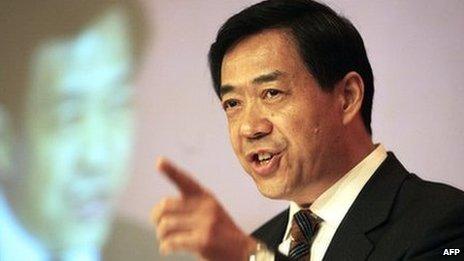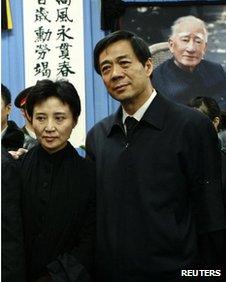Profile: Bo Xilai
- Published

Bo Xilai hails from one of China's powerful political families
Bo Xilai was one of the Communist Party's top leaders before he was felled by one of the biggest scandals to rock China in years.
Bo, 64, was the party chief of Chongqing in south-western China and a member of the powerful politburo - one of the 25 most senior party officials in the country.
Charismatic and suave, he was a prominent figure who enjoyed being in the limelight, a trait that set him apart from other Chinese politicians.
But he fell from power amid a scandal that emerged in February 2012, when his former chief of police in Chongqing, Wang Lijun, spent a day at a US consulate in Chengdu.
Wang, who has since been jailed for 15 years, triggered an investigation into the murder of UK businessman Neil Heywood. Bo's wife, Gu Kailai, has since been convicted of the killing and given a suspended death sentence.
Bo was removed from his post as party chief in Chongqing in March 2012. On 25 July 2013 he was charged with bribery, corruption and abuse of power.
He had taken advantage of his office to accept an "extremely large amount" of money and properties, state-run news agency Xinhua said, citing the indictment.
Bo Xilai went on trial on 22 August 2013 at the Intermediate People's Court in Jinan.
The court took the unprecedented step of posting some live updates of his trial on Sina weibo, one of China's Twitter-like microblogs, although the information posted could not be independently verified.
The dramatic five-day trial saw Bo launch a vigorous defence. He made lengthy comments in court denying the charges, and cross-examined one of the witnesses.
Nonetheless, he was found guilty on all charges on 22 September and given a lifetime jail sentence.
'Princeling' status
Like Xi Jinping, who became China's leader in late 2012, Bo Xilai is a "princeling" - someone who hails from China's elite political circles.
Their fathers were Mao Zedong's comrades and later served under Deng Xiaoping as top officials.
Bo Xilai is the son of Bo Yibo, a powerful Communist Party elder and revolutionary Red Army commander.
As a child, he attended a top school in Beijing with other children of important officials.
But during the Cultural Revolution, the senior Mr Bo was purged from his official posts and the younger Bo spent time at a labour camp.
He met and began a relationship with his first wife, Li Danyu, a military doctor who was also from an elite political family. The couple married in 1976 and had a son the following year.
After the Cultural Revolution ended, Bo enrolled in the prestigious Peking University, studying history.
He joined the Communist Party in 1980 and earned a masters degree in journalism from the Chinese Academy of Social Sciences in 1982.
In the 1980s, the Bo family's star began to shine again and Bo Yibo became one of the powerful ''Eight Elders'' of the Communist Party.
Fast track
Bo Xilai moved to the north-eastern Liaoning province. It was during this period, in the early 1980s, that he left his first wife and married Gu Kailai.

Bo Xilai (R) and Gu Kailai at Bo Yibo's wake in 2007
Like her husband, she hailed from a distinguished background - she is the youngest child of a prominent revolutionary and a trained lawyer who also studied at Peking University.
Their only son, Bo Guagua, who studied at Oxford and Harvard University, was born in 1987.
Bo Xilai's political career was set on the fast track when he was appointed mayor of the coastal city of Dalian.
He was credited with the stellar success and transformation of Dalian from an unremarkable port to a major city - one of the cleanest in China and a showcase of China's economic boom.
It was also in Dalian that Bo and Gu Kailai reportedly first met Mr Heywood.
In 2001, thanks - it is said - in part to active campaigning by his father, Bo was appointed governor of Liaoning province. Three years later, he became China's commerce minister.
At the last party congress in 2007, he was given a seat on the politburo. He reportedly had ambitions for the top ranks - the politburo standing committee. Some analysts believe that Bo Yibo's death in January that year diminished his chances.
'Chongqing model'
Bo Xilai was instead appointed party chief of Chongqing. He became well-known there for running two major campaigns in the city.
One was a high-profile crackdown on crime, which many welcomed but led to allegations that abuses were taking place.
The other was to promote China's communist past - harking back to old communist values that generated nostalgia for the days of Chairman Mao, including the public singing of "red songs".
He advanced the "Chongqing model" of development, using state funds to boost consumption and investing in public housing and infrastructure.
But while he appeared to be popular with the city's poor and working-class citizens, his ambition and flamboyant style earned him enemies and raised eyebrows among party leaders back in Beijing, analysts said.
''Nobody really trusts [Bo Xilai]: a lot of people are scared of him, including several princelings who are supposed to be his power base,'' Cheng Li, an expert in China's political elite at the Brookings Institution, has been quoted as saying.
His fall from grace, when it came, was swift and dramatic. After his former ally Wang Lijun fled to the US consulate, rumours connecting Bo's wife to the murder of Neil Heywood began to circulate.
Then in April 2012 came formal confirmation - Bo had been stripped of his official posts and his wife was being investigated for murder.
Now both she and Wang have been jailed.